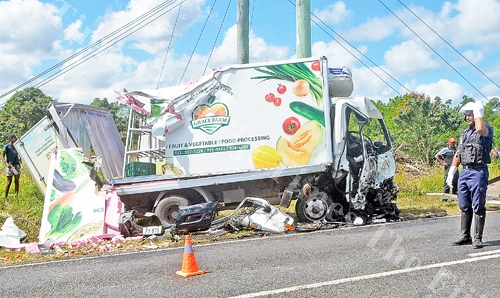RESPONDING to any emergency situation is a vital piece of information everyone should be aware of.
Every road user should be aware that they could come across minor/major road accidents while travelling on the road, therefore, it is important that he/ she is well equipped with information in responding to such incidents.
We witnessed a horrific road accident at Nabou, Sigatoka, a fortnight ago.
It was one of Fiji’s worst road accidents as six people died on the spot while the rest of the victims were rushed to the Lautoka and Nadi hospitals. Two of the victims died a week later.
This accident leaves behind many questions which are not just for emergency services but for all other responsible Fijian citizens to answer.
Soon after the tragedy happened, pictures of dead bodies were circulated on the popular social networking site Facebook.
These pictures were of course taken by some of the first people to arrive at the scene straight after the accident.
The victims were helpless, some were dead, yet people had the confidence to take pictures and circulate them to their circle of friends which went viral on social media a few minutes after the accident.
Immediate family members had not even been informed and some only found out about the passing of their loved ones through Facebook.
This is sad for a small country such as Fiji, a country known to be filled with people who respect, care and love one another.
While some helpful Fijians were trying to assist in the safe removal of the victims from the wreckage, others were there taking pictures and even videos and sending them to their social media contacts.
This is the sad reality in our country nowadays. It seems that people are more concerned about taking pictures rather than assisting.
It was also sad to note that emergency services responses arrived late to the scene when a few of the first respondents were already trying to assist in the removal of the bodies from the wreckage.
Police Commissioner Brigadier General Sitiveni Qiliho had confirmed to this newspaper earlier that he received a telephone call on the morning of the Nabou accident.
The call came from one of the first respondents to the scene who had tried in vain to contact the Nadi Police Station.
The respondent came upon the horrific scene of lifeless bodies on the road and inside the mangled truck and injured trapped inside the grey minibus while travelling along the Queens Rd.
He claimed that he had placed several calls to the Nadi Police Station but no one picked up the telephone.
He then rang a relative in Suva who managed to get in touch with the Police Commissioner.
The respondent said it was through Brig-Gen Qiliho’s assistance that police were scrambled to the scene of the fatal accident.
In response to questions from this newspaper about the slow response by police to the accident scene, police spokesperson Ana Naisoro said the accident had resulted in traffic congestion which led to delays.
“Officers had been sent to the accident site, however, due to the buildup of traffic from both directions it was genuinely difficult to get through quicker than we would have liked,” she said.
“However, we do commend those who arrived at the scene and had assisted in whatever way possible until authorities arrived and we do commend them for their help.”
Emergency services response to road accidents should always be prompt. But it was not the case for the recent accident in Nabou.
The respondent also claimed that an ambulance that arrived at the scene was not able to assist those who had been injured because neither the driver nor his assistant were trained medical personnel.
According to toolkit.irap.org crash victims have a better chance of recovery, or avoiding death, if they receive quick medical treatment at the scene of an injury (often referred to as ‘the golden hour’).
For this reason, improving first aid skills for the general public is also a good way to improve survivability after a crash has occurred.
It added that significant improvements in safety outcomes can be made from improving existing emergency response services, especially where these are currently poor.
The World Bank suggests the following factors are important for effective post-crash care:
Efficient emergency notification Fast transport of qualified medical personnel Correct diagnosis at the scene Stabilisation of the patient Prompt transport to the point of treatment Quality emergency room and trauma care Extensive rehabilitation services.
The toolkit.irap.org added that other emergency services (such as the police or fire brigade) could help make response times quicker by giving medical services teams accurate information about the location, and the number and severity of injuries.
A sad reality
Listen to this article:



